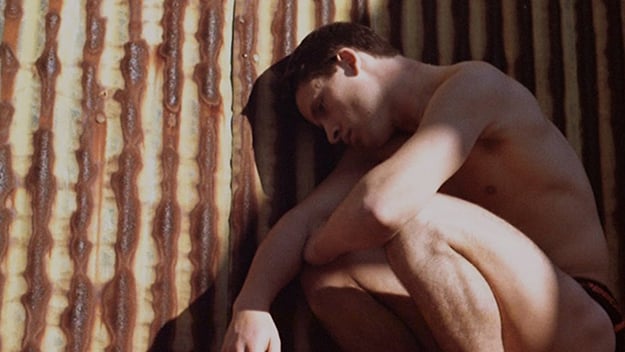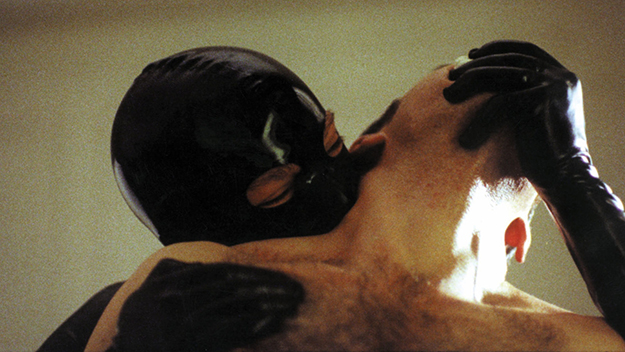Queer & Now & Then: 2000
In this biweekly column, Michael Koresky looks back through a century of cinema for traces of queerness, whether in plain sight or under the surface. Read the introductory essay.

Images from O Fantasma (João Pedro Rodrigues, 2000)
Now here’s a movie image to kick off the millennium: a young man tightly encased in a form-fitting rubber fetish suit and mask, the only part of his body visible his brooding, bee-stung lips, scours and scavenges and scurries crablike around a monumental trash heap on the outskirts of Lisbon. Utterly feral yet driven by identifiable human desires, he catches a stray rabbit and carries the terrified creature around by its ears, only stopping to drink from a brown, fetid puddle that will summarily make him vomit. These images come near the end of O Fantasma, the debut fiction feature by Portuguese director João Pedro Rodrigues that heralded one of the most consistently surprising, confrontational, and unapologetically erotic filmmaking careers of this young century.
Too often when we talk about queer cinema, we focus on social import rather than sexual representation; it seems like a blind spot at best, vaguely puritanical at worst. From the start, Rodrigues has managed to wed eroticism—and very specifically queer eroticism—to his films’ complex thematic architecture. His films don’t stop, as most do, for sex; sex is a part of their essential physical beings. Even when they approach the metaphysical, as in his pansexual reincarnation fantasia Odete (2005)—released here as Two Drifters—or his dreamlike Fassbinder-homage melodrama To Die Like a Man (2009), or, perhaps his greatest, The Ornithologist (2016), a meditative, romanticist’s journey into nature with Christian imagery that approaches the pleasantly blasphemous, Rodrigues’s films are united by their refusal to separate body and soul: in his films body is soul.
With O Fantasma, Rodrigues boldly united eroticism and fetish in an opaque character piece that ties gay longing to social disenfranchisement all while dangerously flirting with the line that separates “narrative cinema” from what many viewers would classify as pornography. O Fantasma is daring, indeed, but less for the content of its occasional explicit imagery than for the unashamed and motivationally ambiguous way it deploys that imagery. Too often films about “dangerous” sexual fantasy draw a sharp line between reality and dream, resulting in a kind of built-in moralizing. Here, Rodrigues fashions an earthy, believable twilight world of erotic possibility and allows his viewers to be both witness to and imaginary participant in it; even when his sexual predation crosses the line, we’ve been so invited to experience our frustrating, frustrated protagonist’s interior state of longing that we’re granted our own symbolic, sexual catharsis.

I’d like to take a very brief moment to situate this film’s shocks in the queer cinematic landscape upon its original release. In fall 2000, when O Fantasma was first making its way around the festival circuit, gay representation seemed to be in a transitional moment. The political and aesthetic gains of the New Queer Cinema movement had begun to result in a kind of broader cultural calcification, with films that relied on certain mannerisms: that year we had the bland gay rom-com designed to offend no one (The Broken Hearts Club), the wider-audience-angling Sundance sensation that used queerness as a tactic for making straight audiences feel uncomfortable (Chuck and Buck), and one noble gay poet biopic (Before Night Falls). And all were preferable to the scene in Cameron Crowe’s Almost Famous in which an otherwise nearly silent character screams, “I’m gay!” because he and the other members of the band think the plane they’re on is going down. After his exclamation, the plane immediately straightens out, the guy darts his eyes around, embarrassed, and clams up again for the remainder of the film, his evidently tortured homosexuality a punchline for the rest of us. (Is this the only “out” character in a Crowe film? Feel free to let me know.) Each of these films is tenuous in its own way, existing in that space after the representational breakthroughs of the nineties and before the falsely presumed “post-gay” era that made the early aughts into a queer movie wasteland. Rodrigues’s film, largely unseen by audiences in the U.S. outside of gay film festivals, has outlived and outranked such tepid exercises.
O Fantasma might as well scream “I’m gay!” as well, right from its opening scene, in which our black-rubber-encased antihero, his ass exposed to the screen by a zipper open from crack to crotch, fucks a naked man, his hands cuffed behind his back, his mouth gagged with cloth. With its bondage gear and the displayed positioning of the bodies, the image clearly has the feel of fetish fantasy, and as the film’s statement of intent—the fucking scene appears as a pre-title-card cold open, now a structural cliché of seemingly every movie—establishes O Fantasma as a film on an autoerotic mission. Rodrigues then flashes back to follow the days and—mostly—nights of Sérgio (Ricardo Meneses), a garbage collector with an intense glower who’s ever so gradually overtaken by his dark desires as he goes on his nocturnal rounds.
Though we see Sérgio taking part in bouts of anonymous, kinky sex—in bathrooms, alleyways, and parked cars—the main object of his obsession is the tall, muscular, and utterly indifferent João (André Barbosa), whom he meets while picking up his mother’s discarded furniture. Like a Kenneth Anger Adonis, João is his own fetish object, an emblem of traditional, presumably hetero masculinity, seen either polishing his glistening Suzuki motorcycle or stripping down to swim laps at the local pool. João’s home-life seems stably middle-class, as indicated by his fenced-off house, expensive bike, and his mother’s ability to donate their second-hand stuff, and is thus depicted as unattainable to Sérgio on multiple levels. Desirable himself, Sérgio is frequently sexually pursued by others—his, frustrated would-be girlfriend, Fátima (Beatriz Torcato); her sort-of boyfriend, Virgilio (Eurico Vieira); a lurking, baton-wielding policeman; random young men at urinals—but as his fixation on João grows, it becomes ever clearer that Sérgio prefers being the hunter to the hunted. At first he skulks around João’s house, sexually mounting his motorbike, picking through his trash, and absconding with his old, torn speedo, which he takes as his own and wears for onanistic pleasure. Soon, he grows more menacing, stalking João, hanging outside his bedroom window, breaking in and urinating on his bed, and, finally, hogtieing and kidnapping him with the seeming purpose of violating him, an act of revenge that comes to feel as class-based as sexually driven.

Sérgio is neither likable nor unlikable; he’s not relatable, but not completely unreadable. Rodrigues visually likens him to an animal, like his dog Lorde, the only being that Sérgio seems to care about on an intimate, emotional level. He’s not a literal character so much as an embodiment of unleashed carnality. The nighttime Lisbon that Rodrigues so evocatively captures in O Fantasma is a cityscape of endless sexual possibilities, but like Sérgio himself these encounters are often provocative in their surreal illogic: at one point early on, Sérgio just happens to come across a policeman handcuffed, gagged, and stuffed in his squad car’s backseat. The situation is difficult to make narrative or situational sense of, but Sérgio’s response—to take sexual advantage of the cop while he’s restrained—makes perfect sense as an erotic game, and as one of many variations on the theme of power and subjugation throughout the film. Two shower scene interludes of Sérgio masturbating provide clues that the film takes its lead from its main character’s compulsive behavior; at one point the young man wraps a shower hose around his neck and nearly asphyxiates himself while jerking off. Rodrigues has spoken of being inspired by the obsessive desires of Tsai Ming-liang’s cinema—and one can certainly see the influence of Tsai’s dissolute 1997 The River, made the same year as Rodrigues’s festival debut, the short Parabéns. But Rodrigues pushes his carnality into the realm of a self-conscious eroticism that’s no less appealing for being unwholesome. O Fantasma overall has the visceral feel of a sex dream conjured in the moment before one nearly loses consciousness.
By the conclusion, Sérgio has transformed into a faceless fetish object himself, a cast-off who creeps and crawls like Judex or Irma Vep among piles of the very same refuse that he has been collecting for deposit outside the city limits. Except he’s no sleek thief or stealth superhero; rather he’s controlled by single-minded libidinousness. Rodrigues, whose extracinematic career has gone on to encompass photography and sculpture exhibitions and multimedia installations, is not creating a character for us to identify with on any level other than as purveyor and repository of erotic desire. Nor is he interested in using that character as part of any example for positive queer representation. O Fantasma isn’t a watershed, but it has no need to be: it’s the grimily gorgeous beginning to a career that has never had to justify itself under any redemptive banner of respectability. Twenty years into the century, such an approach still feels awfully queer, in the best, most rare and radical way.
Michael Koresky is a writer, editor, and filmmaker in Brooklyn. He is cofounder and editor of the online film magazine Reverse Shot, a publication of Museum of the Moving Image; a regular contributor to the Criterion Collection and Film Comment, where he writes the biweekly column Queer & Now & Then; and the author of Terence Davies, published by University of Illinois Press, 2014.







